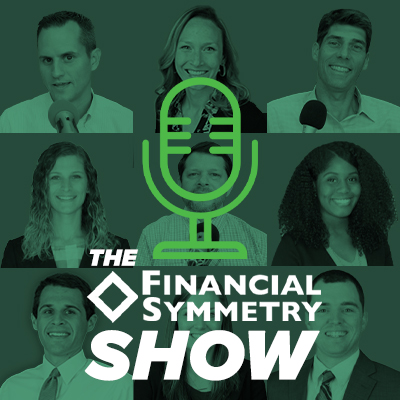A few weeks ago, we had the opportunity to host a client webinar focused on the recent market volatility and what it means for your investment journey. We were pleased to welcome Dr. Apollo Lupescu to offer his expert perspective in these unprecedented times. This blog series will break down our engaging conversation to address your most pressing concerns.
Apollo Lupescu is a Vice President at Dimensional Fund Advisors, where he started in 2004 after finishing his PhD in economics and finance at the University of California, Santa Barbara. During his tenure at the firm, Apollo has gained experience in a wide variety of practical subject matters. He is currently Dimensional’s “secretary of explaining stuff.” In this role, he frequently presents around the country and the world at financial advisor professional conferences and individual investor events. Prior to joining Dimensional, Apollo had his own consulting firm, which provided services to the US Department of State and the White House on a variety of projects. In addition to his PhD from UCSB, Apollo has a BA from Michigan State University, where he competed in and coached water polo.
While I would have loved to hear about Apollo’s water polo career, we dove right in to your top questions.
What implications does the COVID 19 Pandemic have for Investors?
The biggest implication Apollo addressed as it relates to the current crisis is the resurgence of the behavioral side to investing. He recalled the remarkable run the stock market has been on over the past 11 years since the end of the financial crisis in 2009 and through the end of 2019. Volatility was incredibly low through this time period while the market rose steadily. Investors were happy to see growing values on their portfolio statements and grew accustomed to market conditions that are not realistic. People became very comfortable buying into the market.
Fast forward to March of 2020, the COVID 19 Pandemic and a sharp stock market decline put us in bear market territory at a rapid pace. All the sudden our human instincts are kicking back in. Be sure to watch the video for Apollo’s entertaining description of how fear is beneficial when an animal is chasing us. We are hard wired to pay attention to things that put us in danger and the current health and economic crisis certainly fits the bill. Is there something dark lurking around the corner? This fear and uncertainty can lead investors to panic sell.
However, the rational side of investing says you should buy low and sell high. From that perspective a 30+% drop in the stock market should be viewed as a positive buying opportunity rather than a reason to flee. The emotional side is quite the opposite and the reason our behaviors in times of fear do not always lead us down the path of being a successful investor.
Are your investments driven by rational thought or emotion? As financial advisors, part of our role is to acknowledge the emotions we are all experiencing through these challenging periods but disentangle them from our investment decisions. This takes discipline, diligence, and having a plan in place to confidently navigate the temporary set backs that will inevitably occur on your investment journey.
FULL VIDEO TRANSCRIPT
Allison: What implications does the COVID-19 Pandemic have for investors?
Apollo: This is certainly the big question that is top of mind. There are multiple indications for investors that I see with respect to Covid-19, and what’s been happening over the past few weeks. And the first implication is it’s actually not related to necessarily the market itself, but something that we have seen over and over in the investment world, which is that when you think about investing, there is the absolute analytical side and the rational side of investing. What we do see is there’s also a behavioral side to investing. And what we’ve seen over the past few weeks is that the behavioral part of investing has resurfaced after years of just being there, but not really sneaking up its head. And what I mean by that, we ended up the financial crisis back in 2009 and for the past eleven years or so, we have had a pretty remarkable market run. And what’s remarkable about the last 11 years, is how unremarkable it’s been.
In other words, what we’ve seen is that the market has been steadily going up and up in a pretty steady fashion. In fact, when you look relative to the historical average, what you see is the past eleven years, up until December, had been unusually quiet. And what it means to me is that investors have gotten used to a type of a market that is just unrealistic, because it has been unusually quiet. What this meant, is that people were not only happy to look at their statements and see that they’ve made money, but also very comfortable buying into the market. And that’s been the case up until a few weeks ago.
Why Fear and Uncertainty Are Dangerous Emotions in Investing [02:10]
Apollo: When Covid came around, the big change that I’ve seen is that not only that the market took a big dip, but from an emotional perspective, people not only became unhappy, to look at their statements because they’re dropping, but something that is part of our human condition has settled back in, which is that we are wired to pay attention to things that put us in danger. One of my favorite sayings, that life wins every day. Death only has to win once. And what it basically means, is that we are much more wired to pay attention to things that get us in danger and trigger a human emotion of fear.
This is what I’ve seen for the past few weeks, when the markets are dipping, we have that fear and uncertainty that accompany a market drop, and the way it manifested in people, not everybody, but I did see in quite a few people, in quite a few events at least, the temptation to think that maybe I should flee and sell. And fleeing is fine, it saved our life, if there was an animal chasing us, you run and that saves your life. But to me, what I’ve seen is that at least towards the beginning of the crisis, there has been that idea that maybe this is not a right time to be invested. And the reason I’m bringing this up is because the rational side of investing says that you should buy low, and sell high. That’s one of the most basic of investment statements. And when you think of the emotional side, it’s quite the opposite. You tend to buy when things go up and you tried to sell when things are low. So we have to be aware that there is a behavioral side. That’s not always leading us as investors to the path of success. And in fact, it could be the opposite.
And I’m not here to tell you that that that emotions are bad. Not at all. It’s totally okay. It’s totally fine to feel the way you feel, because that’s what makes all of us human. I’m just making everybody aware that quite often when you’re thinking about making an investment decision, you have to ask, is that driven by a lot of rational thought or is it driven by emotions?
How Financial Advisors Help Combat Emotional Influences When Investing [04:15]
Apollo: And I think that’s where Financial Symmetry and Allison and the team come in, because what good advisers trying to do, is pay attention to emotions. And at the same time disentangled them from investment decisions. In other words, pay attention to emotions. But don’t make investment decisions that are clouded with emotion. That was towards the first part of the Covid, when the markets are really going down. We had that bumpy ride. And then all a sudden we hit about a month and a half ago. We hit the bottom. And that was a really big moment of fear. And volatility was high in the market. And ever since then, we’ve been on this upswing in the market. And what I’m seeing is that that investors are still concerned about what’s going on but is a different type of concern. And the concern is that perhaps the market just hasn’t really paid attention because there’s so much bad news going on in the economy.
And yet somehow the markets staged this rally. And there’s a big disconnect between Main Street and Wall Street, between the stock market and what’s going on in the economy. And that disconnect at some point will come due. And then and then maybe the market will tank again, which kind of goes back to this idea of, is this more emotional or is this rational?
So, it’s the cycle of emotions that’s up and down and up and down, that I’ve seen resurface over the past few weeks. And we can talk more about the disconnect between the market and the economy. But that’s kind of what I’m seeing now, is that people are from an investment perspective, they are curious about why is it, that the market has rebounded so much when there are 33 million people unemployed and the economy is shut down. So, to me, that’s what I’ve seen, is these cycles when it started with really a lot of panic, then things that break the market’s been going up and up and up for a few weeks. But once again, there’s a concern, a lingering concern of why is the market going up? And then maybe somebody once again thinking that that there’s something dark coming around the corner.





